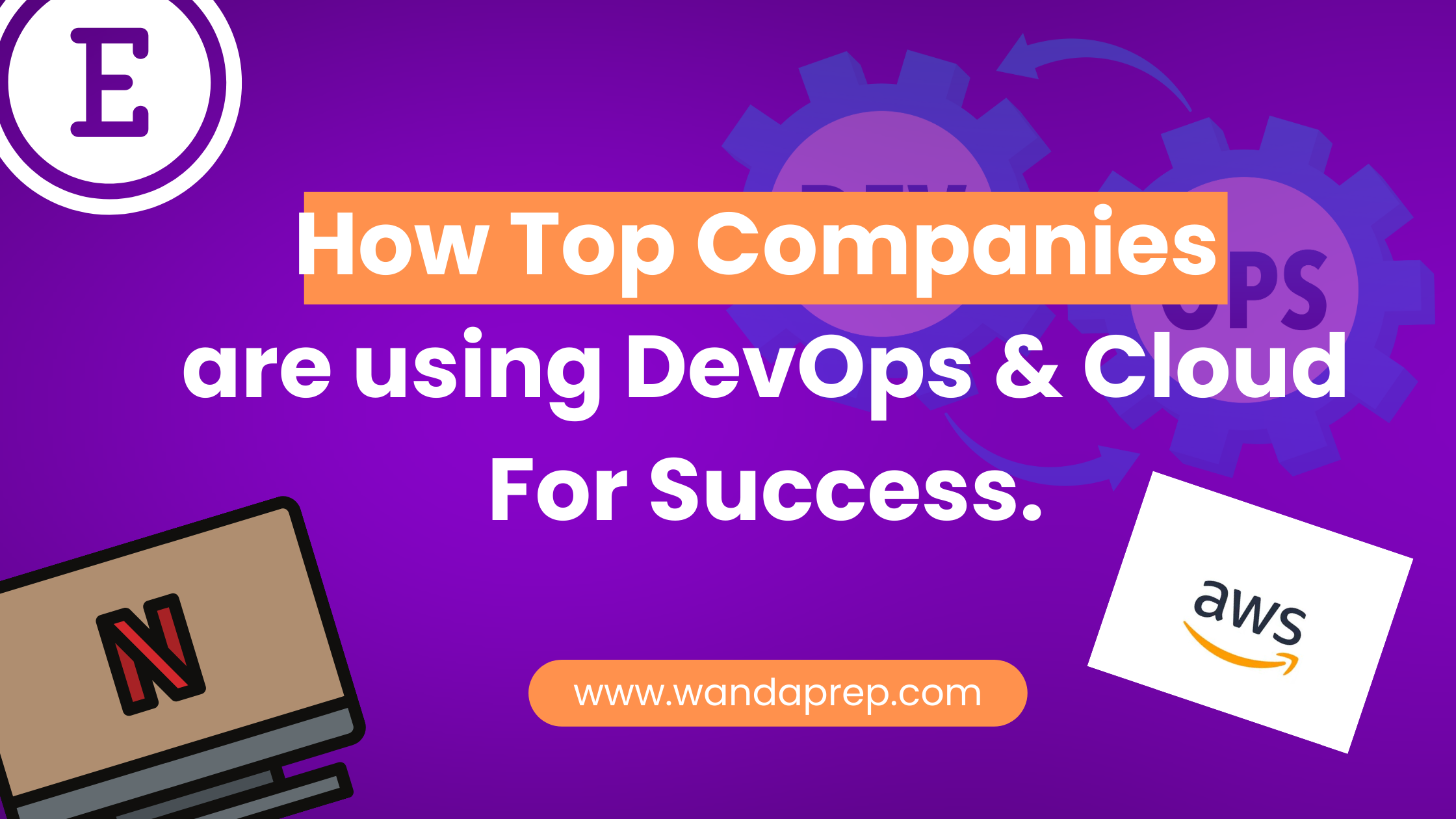
In today’s fast-paced and ever-evolving business landscape, DevOps and Cloud Computing have become integral to the success of top companies. DevOps, a collaborative approach that integrates software development (Dev) and IT operations (Ops), aims to shorten the system development life cycle and provide continuous delivery with high software quality. On the other hand, Cloud Computing offers scalable and flexible IT resources on a pay-as-you-go basis, enabling businesses to adapt to changing demands and innovate at a rapid pace.
The significance of these technologies cannot be overstated. They have revolutionized the way businesses operate, allowing for greater efficiency, agility, and innovation. Top companies across various industries have embraced DevOps and Cloud Computing to streamline their processes, accelerate time to market, and enhance customer experiences.
In this blog post, we will look into how leading organizations use the power of DevOps and Cloud Computing to achieve remarkable success. By examining their strategies and best practices, we aim to shed light on the transformative impact of these technologies and provide valuable insights for businesses seeking to thrive in today’s competitive environment.

The Power of the Combination
Imagine a well-oiled machine where development and operations teams work in perfect harmony. This is the magic that DevOps brings to the table. Traditionally, these teams operated in silos, leading to delays and inefficiencies. DevOps bridges this gap by promoting a culture of collaboration and shared responsibility. Developers write code with deployment and maintenance in mind, while operations teams gain a deeper understanding of the development process.
Now, add the flexibility and scalability of Cloud Computing to this mix. Cloud platforms like Amazon Web Services (AWS), Microsoft Azure, or Google Cloud Platform (GCP) provide on-demand resources like virtual machines, storage, and databases. This eliminates the need for companies to manage their own physical infrastructure, saving time and money.
So, how do DevOps and Cloud work together to streamline software development? Here’s how:
- Continuous Integration and Delivery (CI/CD): DevOps practices automate tasks like code testing and deployment. With cloud-based tools, developers can integrate their code changes frequently and deploy new features rapidly.
- Scalability on Demand: Cloud resources can be easily scaled up or down based on application needs. This allows companies to handle unexpected traffic surges or experiment with new features without worrying about infrastructure limitations.
- Improved Collaboration: Both teams access the same cloud environment and tools, fostering better communication and transparency throughout the development lifecycle.
The combined power of DevOps and Cloud unlocks several benefits for businesses:
- Increased Agility: Faster development cycles allow companies to adapt quickly to changing market demands and deliver new features sooner.
- Enhanced Collaboration: Breakdown of silos fosters a culture of shared responsibility and improved communication between teams.
- Cost-Effectiveness: Cloud eliminates the need for upfront hardware investments and allows businesses to pay only for the resources they use.
By leveraging this powerful combination, top companies are achieving significant competitive advantages.
Real-World Examples
Let’s see how some industry leaders are putting DevOps and Cloud to work:
1. Netflix: The Streaming Giant with Unmatched Agility
Netflix, the king of streaming content, is renowned for its rapid release of new shows and movies. This wouldn’t be possible without their robust DevOps and Cloud strategy. Netflix utilizes tools like Jenkins for continuous integration and deployment, allowing them to push out new content updates seamlessly. Additionally, their entire infrastructure runs on Amazon Web Services (AWS). This cloud-based approach provides Netflix with the scalability needed to handle millions of concurrent viewers without compromising performance. As a result, Netflix can experiment with new features, personalize content recommendations, and deliver exceptional streaming experiences – all thanks to their DevOps and Cloud expertise.
2. Amazon: The E-commerce Leader with Unmatched Scalability
As the world’s largest online retailer, Amazon experiences massive fluctuations in traffic throughout the year, particularly during peak shopping seasons like Black Friday. To handle these surges efficiently, Amazon relies heavily on DevOps and Cloud Computing. Their in-house DevOps tools automate tasks like code deployment and infrastructure provisioning, ensuring rapid scaling of resources to meet demand. Additionally, Amazon leverages its very own cloud platform, Amazon Web Services (AWS), for its infrastructure needs. This allows them to scale compute power, storage, and database capabilities instantly, ensuring a smooth shopping experience for millions of customers globally. By embracing DevOps and Cloud, Amazon maintains its position as a leader in e-commerce with unmatched scalability and resilience.
3. Etsy: The Handmade Marketplace with Unmatched Innovation
Etsy, the thriving online marketplace for handmade goods, fosters a vibrant community of sellers and buyers. To keep this platform innovative and secure, Etsy utilizes a robust DevOps and Cloud strategy. They leverage tools like GitLab for version control and continuous integration, allowing sellers to add new products and features efficiently. Additionally, Etsy utilizes a multi-cloud approach, employing services from both AWS and Google Cloud Platform (GCP). This diversified cloud strategy provides redundancy and ensures Etsy’s platform remains available even during unexpected outages. By adopting DevOps and Cloud Computing, Etsy empowers its creative community and fosters a dynamic marketplace that thrives on innovation.

Building Your DevOps & Cloud Strategy
Inspired by the success stories of leading companies, you might be wondering how your business can leverage DevOps and Cloud Computing. Here are some key considerations for building a winning strategy:
- Cultural Shift: DevOps is more than just tools and technology. It requires a cultural shift within your organization. Foster collaboration between development and operations teams, emphasizing shared responsibility and communication.
- Choosing the Right Tools & Platform: With a vast array of DevOps tools and cloud platforms available, carefully assess your specific needs and resources. Consider factors like scalability, security features, and existing skillsets within your team.
- Upskilling Your Workforce: The transition to DevOps and Cloud may require training and upskilling your IT personnel. Invest in training programs to equip your teams with the necessary skills to navigate these new technologies effectively.
Here are some additional tips:
- Start Small and Scale Gradually: Don’t try to overhaul everything at once. Begin by implementing DevOps practices within a single project and gradually expand your efforts as you gain experience.
- Focus on Automation: Identify repetitive tasks within your development and operations processes, and automate them using DevOps tools. This will free up your team’s time to focus on higher-level activities.
- Measure and Monitor: Continuously monitor your DevOps and Cloud implementation, tracking key metrics like deployment frequency and lead time. This data will help you identify areas for improvement and optimize your strategy over time.
By taking a thoughtful and measured approach, you can leverage DevOps and Cloud Computing to achieve greater agility, scalability, and cost-efficiency within your organization.
Conclusion
In today’s competitive business landscape, agility and innovation are paramount. By strategically adopting DevOps and Cloud Computing, leading companies are achieving remarkable results. We’ve seen how these technologies empower businesses to streamline development cycles, foster collaboration, and achieve unmatched scalability.
The takeaway is clear: DevOps and Cloud Computing are not just trends, but powerful tools for driving success.
Are you ready to unlock the potential of these technologies for your business? Consider the tips outlined in this blog post to build your own DevOps and Cloud strategy. Explore the resources available online to delve deeper into these topics and discover how they can benefit your specific industry and goals.
Learn more about DevOps and Cloud computing with Wandaprep
